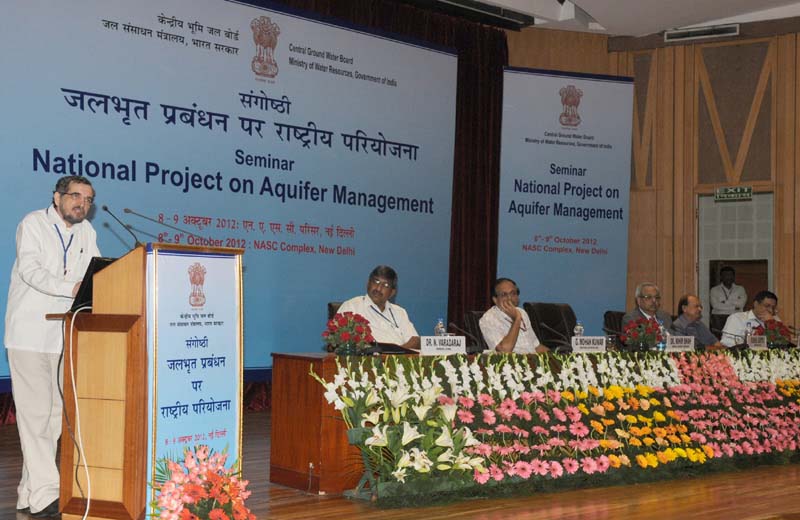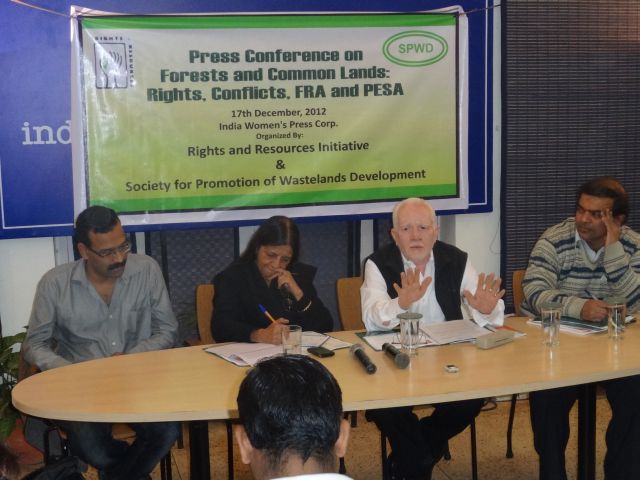Amita Bhaduri
Traditional diversion-based phad irrigation systems help mitigate risk of crop failure in the drought-prone farmer suicide belt of Vidarbha, Maharashtra
Posted on 11 Jan, 2013 11:56 AMMany of these systems (1) continue to function and are often more sustainable, cost-effective and successfully managed by local institutions. Phads are one such community-based and managed diversion irrigation management system (2) prevailing in the north-western part of Maharashtra and date back to the early 16th century as per historical accounts. The system is prevalent in the Tapi basin on rivers the Panjhra, Mosam and Aram in Dhule and Nashik districts (3).
Phads or diversion-based irrigation systems, are being revived and promoted in Vidarbha region of Maharashtra by Dilasa, a Yavatmal-based voluntary development organisation (Video courtesy: Dilasa)
Climate change adaptation in water management for food security - A consultation meeting by India Water Partnership
Posted on 19 Dec, 2012 09:20 AMThe meeting held on 22nd November, 2012 at the Institute for Human Development, New Delhi was followed by a discussion which included comments and suggestions of the experts and participants. The meeting was chaired by Prof. S R Hashim, President, India Water Partnership who was accompanied by Dr.
Seminar by CGWB on National Project on Aquifer Management stresses the need for a paradigm shift in groundwater sector from development to management
Posted on 10 Dec, 2012 05:39 PM
Inaugural session chaired by Dr. Mihir Shah
Image courtesy: www.readandknow.org
Living rivers, dying rivers: Stuffed rivers of Vrishabhavathi-Arkavathi from the Cauvery system
Posted on 02 Dec, 2012 08:16 PMIntroduction

MoWR stresses the need to provide momentum to our conservation efforts on water conservation day
Posted on 23 Nov, 2012 02:12 PMThe Union Ministry of Water Resources (MoWR) celebrated “Water Conservation Day" on the 19th of November 2012 to create awareness regarding depleting water resources and underlined its vision and commitment to be an active contributor to the sustainability of this very important natural resource. The field offices of various organizations under the administrative c
River and people on collision course
Posted on 05 Oct, 2012 05:11 PMThis bilingual book written in Hindi and English appearing side-by-side titled “Bagawat par majboor Mithila ki Kamla nadi” and “Kamla: River and the people on collision course” respectively attempts to study the irrigation and flood control schemes that were taken up in the Kamla basin following independence and depicts how people have been left in a blind alley.
Machhu dam disaster of 1979 in Gujarat – Discussion on a book by Tom Wooten and Utpal Sandesara
Posted on 07 Sep, 2012 06:12 PMA discussion was organised on a new book by Tom Wooten and Utpal Sandesara - "No one had a tongue to speak" that spectacularly reconstructs the 1979 Machhu dam disaster in Gujarat, one of history’s worst disasters. The meeting was organised by SANDRP at India International Centre, New Delhi on 30th July, 2012.
Conservation at crossroads – Science, society and the future of India’s wildlife – A talk by Ghazala Shahabuddin
Posted on 05 Sep, 2012 03:48 PMGhazala Shahabuddin’s recent talk on 30th August, 2012 at IIC, New Delhi focused on the malaise underlying India’s dominant conservation paradigm, which is for the most part one of top-down control and exclusion.

